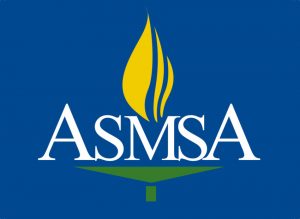Autumn Bates – 2018 Arkansas Soybean Science Challenge Award Winner Arkansas School for Mathematics, Sciences and the Arts Science Fair
 HOT SPRINGS, Ark. — Autumn Bates, 18, a senior at the Arkansas School for Mathematics, Sciences and the Arts in Hot Springs won the Soybean Science Challenge at the 2018 science fair held at the school Feb. 21.
HOT SPRINGS, Ark. — Autumn Bates, 18, a senior at the Arkansas School for Mathematics, Sciences and the Arts in Hot Springs won the Soybean Science Challenge at the 2018 science fair held at the school Feb. 21.
Bates received a $300 cash award provided by the Arkansas Soybean Promotion Board at the Awards Ceremony on Feb. 23. Her science project titled “Bio (logical) Control (Control of Soybean Aphids in Arkansas)” also won the Arkansas State University Walton Sustainability Solutions Award; this award is in recognition of the creation, design and development of innovative solutions that directly address our planet’s sustainability challenge. Her project also placed third in plant sciences at the Junior Academy of Sciences. Dr. Jon Ruehle, Bate’s teacher, won the Soybean Science Challenge Teacher Mentor Award.
Ruehle said, “Autumn designed her project with little input from me beyond presenting the core concepts and facilitating her ideas with materials and equipment. Autumn did not start where she is now; she earned it by hard work and creative application of what she learned.” Participating in The Challenge added to Ruehle’s enthusiasm for seeking out significant research opportunities and community support for their students. “The answer to any problem or circumstance is always education, and dedicated partners in education form the community where our young people can thrive and grow.”
Bates was astounded that her project was chosen to win the Soybean Challenge because there were so many other amazing soybean projects from other ASMSA students this year. She is grateful to have had the opportunity to compete for the award and is thankful that the judges were as excited about her project as she was.
Ruehle had Bates participate in the Soybean Challenge because they were looking at biocontrol methods as a sustainable approach to crop protection that was ecologically sound and applied to real life situations. Soybeans was the obvious model choice.
When Bates took the Soybean Science Challenge online course, she found learning about soy nutrition to be one of the most interesting topics. As a vegetarian, soybeans allow her to eat a sustainable healthy diet; it was only after watching the module that she realized just how important a role soybeans play in her every day meal plan.
Prior to completing the online course and conducting the research, Bates said she knew only that soybeans were grown locally. She and Ruehle both agreed that taking the online course provided her with a solid background in the science and practice of soybean agriculture. Bates said that her participation in the Soybean Science Challenge gave her a focus, a clear defined goal for her research. It allowed her to familiarize herself with something that was important to her and gave her the chance to pave the way for, and bring attention to topics she is an advocate for.
Terry Bates, Autumn’s father, was thrilled for her award. “She left home at 16 to attend ASMSA and even while attending Star City High School, she won awards for the highest grade in science out of all her classmates. Autumn has always been very dedicated, all on her own. In fifth grade she started experiments on plants with colored water trying to create a rainbow rose. It was that project that opened the door to her love of botany, and she especially enjoys learning about the genetics of plants.”
Ruehle believes Bates has the intelligence and determination necessary for considerable academic successes as she develops the confidence to be a serious student. Autumn particularly enjoyed the college-transfer botany class which led into the research project she implemented on evaluating biocontrol methods to protect soy plants.
“The Soybean Science Challenge allows Arkansas senior high students to participate in scientific discovery that can make a difference to our state and the world,” said Karen Ballard, professor at the University of Arkansas System Division of Agriculture’s Cooperative Extension Service. She is the developer and director of the program. “Soybean farmers help feed the world, and Soybean Science Challenge students not only learn about this important commodity crop, but they also develop an understanding of the challenges and complexity of modern farming.”
“The goal of the Arkansas Soybean Science Challenge is to engage students in ‘real world’ education to support soybean production and agricultural sustainability,” said Gary Sitzer, chairman of the Arkansas Soybean Promotion Board. “The program also rewards scientific inquiry and discovery that supports the Arkansas soybean industry.”
Information on the 2018-19 Arkansas Soybean Science Challenge will be available in summer 2018. For more information, contact Dr. Karen Ballard at kballard@uaex.edu or Dr. Julie Robinson at jrobinson@uaex.edu.
About the Division of Agriculture
The University of Arkansas System Division of Agriculture’s mission is to strengthen agriculture, communities, and families by connecting trusted research to the adoption of best practices. Through the Agricultural Experiment Station and the Cooperative Extension Service, the Division of Agriculture conducts research and extension work within the nation’s historic land grant education system.
The Division of Agriculture is one of 20 entities within the University of Arkansas System. It has offices in all 75 counties in Arkansas and faculty on five system campuses.
The University of Arkansas System Division of Agriculture is an equal opportunity/equal access/affirmative action institution. If you require a reasonable accommodation to participate or need materials in another format, please contact kballard@uaex.edu as soon as possible. Dial 711 for Arkansas Relay.
Autumn Bates: Arkansas Soybean Science Challenge Regional Winner – Arkansas School of Mathematics, Sciences, and the Arts – Dr. Jon Ruehle, Teacher Category: Plant Sciences Project Title: “Bio (logical) Control (Control of Soybean Aphids in Arkansas”
Abstract:
Soybeans are an important food crop, but are highly susceptible to aphids, and sensitive to most pesticides suggesting that more organic methods might be better for maintenance of crops should pest issues arise. Additionally, treatment of soybean aphids with pesticides can be difficult due to natural feeding habits of aphids underneath the leaves of soybean plants. Biocontrol requires more planning and research than pesticides to avoid introduction of alien species, but may provide a healthier, more sustainable way to deal with aphids. The use of pesticides has been linked to many negative health effects to handlers, consumers, and to the surrounding environment, which has encouraged the organic farming movement. Two biological control agents native to Arkansas, green lacewing larvae and ladybug larvae, were tested.
The final dry mass relative to the cost of biocontrol agent per plant treated with pests compared to the untreated ones was tested to determine which of the two native biocontrol agents was most economical. Analysis by T test showed that soybean plants inoculated with aphids and treated with ladybug larvae had greater dry mass than aphid-infested soybeans treated with green lacewing larvae where plants treated with lacewing larvae were approximately half the mass of plants treated with ladybug larvae. Ladybug larvae allowed greater biomass productivity of the soybean plants in general and on a pure cost basis, even though ladybug larvae cost more individually than lacewings. These results support the claim that ladybug larvae are a more effective biocontrol agent for soybeans.
